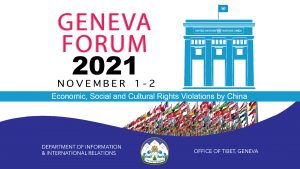Theme 4
Countering China’s Persecution of Believers: Way Forward?
When China opened itself to the international community in the 1970s, it ushered a hope that the Chinese Communist Party would join the rest to fulfil the common values by fostering economic interdependence. This view was also bolstered with China coming forward to follow the international norms of humanity by signing the Universal Declaration of Human Rights (UDR) in 1971. However, the hope still remains to be realized. Moreover, and rather pressingly, we fear that an Orwellian China is rearing its rivalled head and posing a threat to the existing international order of things. It has complicated the protections of human rights: one the one hand, it continues to discriminate its citizens through religious crackdown by evading transparency, but on the other hand, poses to show compliance with international norms such as by signing the UDHR.
One such area where the CCP-led Orwellian China has continued to act treacherously is the freedom of religion or belief. Since the creation of the People’s Republic of China under Chairman Mao Zedong, religion has been deemed evil vis-à-vis the state. It is no surprise that this legacy runs deeply within the CCP as we know it today, currently headed by President Xi Jinping. The CCP brands itself atheist in profile. We have now however understood that this atheism is far from inert: the instrument that sanctions religions (5 in total) in China is the same one that criminalizes others like the practice of Falun Gong. Such interpretation of atheism that the CCP subscribes to — selecting and excluding at whim — is obviously just another tool to muster absolute control. It is far from being accommodating about the diverse faith-based communities, and rather more of squeezing the religious practices into its own mould.
The CCP has become despotic and is propagating its brutal regime via propaganda, surveillance, misinformation, denial of truth and manipulation of the past. China is forcing many countries to tiptoe to its diktats. China is only growing firmer with increasing networks of advocates inside and outside – especially forged through economic dependencies such as debt trap – to challenge the international order today. It thus undermines the core norms of human rights such as religious freedom during and after the fact of establishing itself as the dominant power.
The influence of China is growing in the international order as well. It is now one of the largest suppliers of United Nations peace keeping forces and also one of the largest contributors to be UN budgets. It recently won a seat to the UN Human Rights Council albeit with reduced support as compared to the past. It has made concerted efforts to ensure that more Chinese nationals are employed in the UN and its various organs. It is trying to shift the fundamental definition of human rights from respect for human beings to economic and developmental related goals. It is further changing the international relations scenario from respect to human rights to respect for state sovereignty.
Within the country itself, the religious persecutions of Tibetans, Uighurs, Christians have been alike in erasing any loyalties that are not directed towards the CCP. Meanwhile, crosses on churches continue to be removed, monasteries fitted with surveillance agents and devices, and mosques facing demolitions. Other belief communities meanwhile suffer imprisonments and falling victims to organ harvesting operations. It is important to thus deeply reflect on how all these persecutions are being committed even with the existing set of checks and balances in our international system to ensure human rights and freedoms. Thus, it is in all our utmost interest that we keep a close look at where China is headed. As the saying goes, only dead fish float. It is thereby paramount that the CCP-led China with its ever-deepening ties with our governments, academic institutions (like Confucius Institutes), civil societies and homes, does not render us mute.
***
QUESTIONS AND ISSUES TO BE CONSIDERED
- How can we ensure that the international norms around human rights such as the freedom of religion or belief remain universal?
- Is the international community in need of a new strategy to ensure the freedom of religion and belief in China? Or, can it rely on old ones by focusing on their proper enforcement instead?
- In what ways and areas can we detect the Chinese Communist Party’s challenging our common values of human rights and freedoms?
- Is there a prospect for change within China by itself?
- What are the people’s voices on freedom within China and how can we amplify them?
- In all this, what are the responsibilities of governments, private sector actors, civil society groups, academic bodies, and international organizations?
- Is it secure in the long run for countries and regional unions to continue bilateral and multilateral relations without calling China to also comply with standard international norms such as the FoRB?


